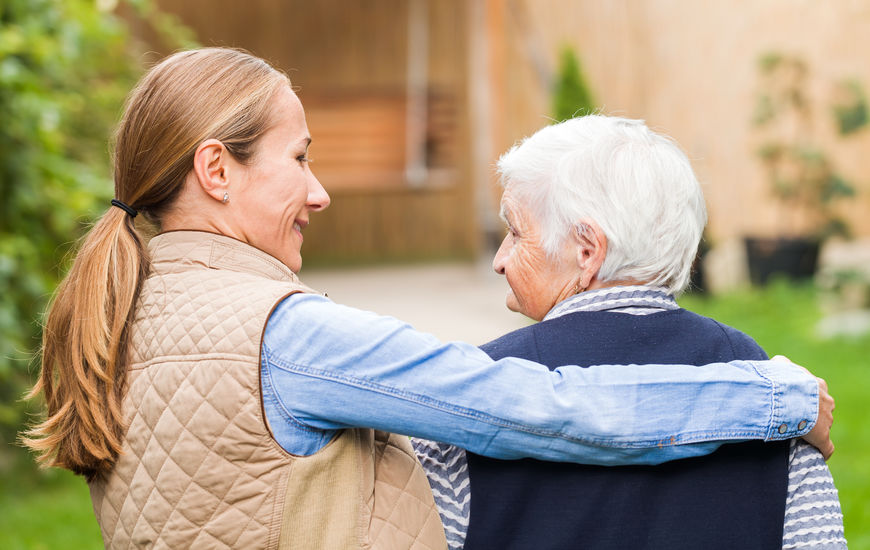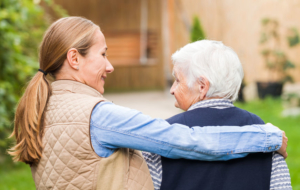Caring for a loved one with dementia can pose many challenges for families and caregivers. Adding the spread of COVID-19 to the equation can make things even more difficult. However, with planning and preparation, there are ways that one can minimize stress and maximize protection for their loved ones and in turn, themselves.
There are many groups that may be at risk for complications from COVID-19. While having dementia or a memory-related disease may not directly increase one’s risk, the behaviors and limitations associated with these conditions can. It’s important to recognize that there are multiple stages of dementia and not everyone needs the same level of care.
How might dementia put my loved one at risk of becoming infected?
The Center for Disease Control (CDC) has identified the following disability types to be possible risk factors:
- Having limited mobility: not being able to avoid coming into close contact with others such as home care providers and family members
- Having difficulty understanding information and practicing preventive measures (i.e. handwashing, social distancing)
- People who may not be able to effectively communicate symptoms of illness
Maintain Calmness and Form a Sense of Routine
Try not to raise any unnecessary level of stress or alarm for the person you are caring for — even in regard to the coronavirus. Use discretion when watching news coverage or discussing sensitive topics around them, as this can help ease any extra stress. Take note of any abnormal or increased levels of confusion or agitation, as this can be a sign of possible illness.
Avoiding exposure and promoting preventative measures such as hand hygiene should be apart of the daily routine. While getting your loved one to properly wash their hands may be a task easier said than done, there are techniques that may make the process easier. Because some people with dementia can’t sequence events properly, using a soothing tone to talk out the steps of handwashing can be helpful. Singing a song like ‘Happy Birthday’ or ‘Twinkle, Twinkle, Little Star’ can also help you reach the 20 seconds necessary to effectively wash their hands.
For Essential Workers
While some are working from home, there are many workers who still leave their homes every day to provide essential services. The the Alzheimer’s Foundation of America (AFA) has provided recommendations for how workers can keep their family members safe when returning home:
- To the best extent, leave what you can at work.
- Empty your pockets before entering the house. If you have a car, it’s best to leave items such as pens and loose change there. Wipe down other items that you need to bring inside such as cell phones and wallets.
- Maintain your distance. Removing clothes that were worn outside and keeping outside items out of reach is recommended.
- Incorporate social time. While maintaining distance is important, it’s also important that family members with dementia not be isolated. Enjoying a television show together, going for a walk or listening to music can help ease stress and increase a sense of companionship.
Stay Prepared
You never know when hospitalization may be necessary, so be prepared in advance for those instances.
- Note personal preferences: Communicating with care staff about your loved one’s preferences can make a huge difference in the quality of their stay. If loud noises or the feeling of water agitate the person, this is important information to share. Finding out if you can arrange phone calls or video-calls with your loved one may be helpful as well
- Have a kit ready: Having a bag prepared with any personal items and legal documentation can ease the stress of a sudden hospitalization. Legal documentation such as healthcare proxy and power of attorney information should be included. Having your loved one wear an ID bracelet may be helpful as well.
Remember self-care
Most importantly, to care for others, you must also care for yourself. While maintaining a positive frame of mind may be difficult, it helps to do so and recognize when you are feeling burnt-out. Meditation, healthy-eating, balanced sleep schedules and enjoyable activities can all aide in reducing stress. When all fails, know that it is ok to ask for help when needed, and having a go to person to call and speak to can help ease some of that caregiver-associated stress.
There are many challenges that present themselves when caring for a memory-impaired loved one during a pandemic, but with preparation, planning, and prevention, it can become easier.
Sources: Alzheimer’s Foundation of America: Coronavirus Recommendations, Center for Disease Control (CDC)


